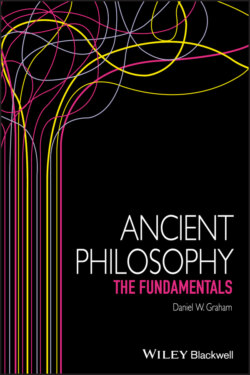Читать книгу Ancient Philosophy - Daniel W. Graham - Страница 9
1.1 From Mythology to Philosophy
ОглавлениеThere is a Latin maxim inspired by early Greek philosophy: ex nihilo nihil fit, nothing comes from nothing. That is a principle of Greek metaphysics, but it also offers a good principle of historiography. Every development has its antecedents, and it is the job of the historian to tell a plausible story of how we, or our predecessors, got from point A to point B. The starting point of our story is Greek mythology. Before there was a philosophical account of the world, there was a mythical account. The world arose in a theogony, a birth of the gods in which one cosmic god begot another and that god begot another. Eventually they quarreled with each other, fought a war, and Zeus emerged as the victor and chief god. In this approach, every important event that happens in the world is the work of Zeus and his companions. The sun is the chariot of the sun‐god Helios, which he drives across the vault of heaven every day. Lightning consists of missiles thrown by Zeus, the Cloud‐Gatherer. Earthquakes are the work of Poseidon, the Earth‐Shaker. (Some) plagues are caused by Apollo, the Far‐Shooter.
That is the starting point of the story of philosophy. Beginning around 600 BC a small group of intellectuals rejected the mythological story and pioneered a new way of thinking about the world. The major events of the world resulted, not from divine interventions, but from processes that are in principle like everyday processes we meet in our experience. These thinkers looked for naturalistic explanations of phenomena in place of supernatural explanations. Their theories were at first, by modern standards, crude. But their ideas developed with remarkable rapidity. In less than three centuries the successors of the first thinkers had developed many of the concepts we use in philosophy today, and some basic principles of science. In effect, they invented philosophy as we know it, and began to call themselves philosophers in the fourth century BC. In the next chapter we will have something to say about how this happened. But for now the important thing is that it did happen.
